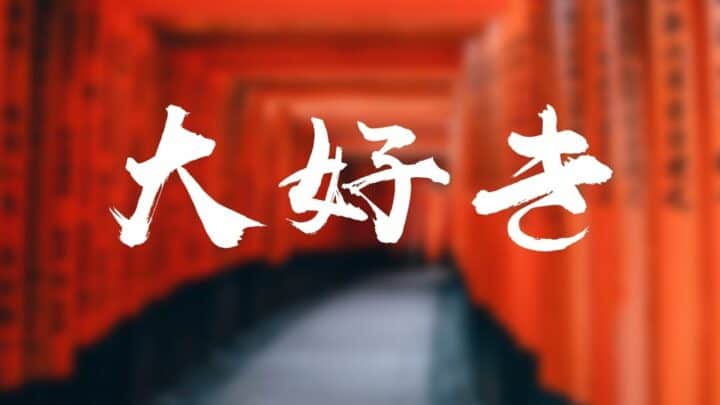Let’s look at a word that it seems like everyone loves to use in Japan.
Tread carefully, however, this word (like, it seems, all words in Japanese) carries more nuance than you might at first expect.
Those pitfalls are pretty easy to overcome, though, and in this article I’ll be guiding you on how to develop an intuition for its use.
So, what is this mysterious word? Daisuki.
Let’s get a bird’s eye view of the expression.
What is the meaning of daisuki?
Daisuki can be broken down as dai-suki to mean, literally, “big like.” In practice, it has two meanings. To “really like” or to “love.” This sense of love can be both romantic, or, like, loving french fries. Context will usually tell you which.
Alright, with that little definition you can stick on a post it and shove in your back pocket, let’s get right into the full-fledged, pedantically ponderous sort of explanation you’ve come to know and daisuki from my articles!
Breaking down the characters in daisuki
Daisuki, like every word in Japanese can be written using only kana. That is, written using only the phonetic “alphabet” of the Japanese language (technically a syllabary, but only nerds will understand that [jk, jk]).
From this alphabet you get a choice of the hiragana だいすき or the katakana ダイスキ.
In practice, the word is usually written with kanji, the complicated characters adapted to the Japanese language from ancient Chinese. In this case it would be written 大好き.
That first character, 大, is pronounced dai (like “die”… or “dye”…. English is weird). And it has a super straightforward meaning: big.
You can translate it with all sorts of words like, “large, great, huge, eminent, grand, severe,” or, heck, “grande, mucho, muy” if you’re hanging out in the Spanish language as well.
Like most kanji in Japanese, 大 has other pronunciations (tai and oo), but when you see it in the word 大好き it will always be pronounced dai. Easy.
The second character is 好 and is pronounced by itself as su.
However, since you’ll always see it (in this context) paired with the character き, which is pronounced ki, you can consider 好き as a single word pronounced suki.
好 as a character means “good, pleasing, fond of.” As before, you’ll see this one with other pronunciations (ko, kono, yo, I)when used in other contexts, but for the word 大好き it will always be pronounced suki.
The complete meaning of daisuki
Daisuki basically comes in two, maybe three flavors. The first is the safest for us. You’d use it anytime you wanted to say that you love something.
For example, pizza, the anime Naruto, or going for walks. It can also be used in the sense of “my favorite X,” as you’ll see in the second example, just by placing “na” in between daisuki and the object of delight.
ピザが大好きです。
Piza ga daisuki desu.
I love pizza.
大好きなピザはこの店にある!
Daisuki-na pizza wa kono mise ni aru!
My favorite pizza is in this shop.
まぁ、アニメは、ナルトがとても大好きです。
Maa, anime wa, naruto ga totemo daisuki desu.
Well, when it comes to anime, I really love Naruto.
夜になって浜にできれば散歩が大好きだ。
Yoru ni natte hama ni dekireba sanpo ga daisuki da.
I love going for a walk at night, if I can make it to the beach.
The next flavor is interpersonal love. This can be both of the sort of “I love you” you might say to someone you’ve been dating for three months, or the “I love you” you give to your new spouse. It also works in families.
アーロン、待って!待ってくれ!お願い。行かないで。私・・・好き・・・いや。大好きですよ!
Aaron, matte! Matte-kure! Onegai. Ikanai-de. Watashi… suki… iya. Daisuki desu yo!
Aaron, wait! Wait, wait! Please, wait. Don’t go. I… like… no. I love you!
お前・・・頑張ってください。頑張れ。お前は強い。胸の中には大変な力あるよ!あの癌を倒すことができる。倒さなくてならない。俺の息子だぜ!長谷川の名は血管の中に流れてるよ!お前は負けてはいけないよ。一郎・・・一郎・・・死ねない。死んではいけないよ。大好きだよ。
Omae… ganbatte-kudasai. Ganbare. Omae wa tsuyoi. Mune-no-naka ni taihen-na chikara aru yo! Ano gan o taosu koto ga dekiru.
Taosanakute-naranai. Ore-no-musuko daze! Hasegawa-no-na wa kekkan-no-naka ni nagareteru yo! Omae wa makete-waikenai yo. Ichiro… Ichiro… shinenai. Shinde-waikenai yo. Daisuki da yo.
Hey you…. You can do it. Hang in there. You’re strong.
There’s so much strength in you! You can beat that cancer. You have to beat it. You’re my son, dammit! The name of Hasegawa flows through your veins!
You’re not allowed to lose. Ichiro… Ichiro… don’t die. You can’t die. I love you.
Okay, I had a little too much fun coming up with those last two melodramatic examples. I hope you enjoyed!
So, all of this should point to the fact that you need to be careful with you use this word. While it directly translates as “I really like X”, in practice it is used the same way a “I love X.”
So, while in English if you really got along with a new acquaintance, you might say, “Wow, I really like you. Let’s meet up again,” you wouldn’t do that in Japanese (unless you wanted to be a creep).
Other forms of daisuki
Drawing from the regional Kansai-ben dialect, we get the casual-sounding word sukiyanen, which you could almost read as “I love ya!”
If we wanted to talk about falling in love we could use suki-ni-naru. Look at this example:
まさか・・・心は天使とともに天国に飛び去りた。僕はあの美女を一目で大好きになってちゃった。
Masaka… kokoro wa tenshi to-tomoni tengoku ni tobi-sarita. Boku wa ano bijo o hitome de daisuki-ni-natteshichatta.
No way… My heart has flown off to heaven with an angel. I fell in love with that beautiful lady at first site.
Other ways to express similar things
We can snip off the dai and just use suki to soften our meaning a bit.
Now we can talk about things we like. I might love pizza, but just love chicken wings. Or whatever.
Note, however, that suki does still carry some potential romantic notions to it.
Just like in English, “like” can mean something very simple, it can also mean (as we used to say in grade school) “like-like,” as in to have a crush on someone.
In fact, you will often hear suki begin used to reveal to a person of interest that someone has a crush on them.
What if we want to be utterly unequivocal about the fact that we love someone?
What if we really need them to know that we, like, deeply love them? For that we turn to our friend aishiteru (written 愛してる).
This word has serious implications. It is unquestionably romantic and deep.
No matter what anime, video games, or dramas may have suggested to you, this word has historically gotten very little play in the real lives of real Japanese people.
That said, it is becoming a little more common these days. Use it with care.
You may also see the word koi, written 恋. This word is a more general love.
A bit deeper than daisuki, but not really romantic like 愛. Koi can be used to talk about familial love, or religious love.
Finally, you’ll also sometimes see the word rabu, a Japanified way of saying “love.” I’ve most often heard it as rabu-rabu, meaning “lovey-dovey.”
Saying the opposite
What if you want to say the opposite of daisuki? Then just swap out the suki with kirai, which means “dislike.” That way we get daikirai, written 大嫌い. Easy!

“I’ve lived in Japan on-and-off for the last five years, travelling to (almost) every corner of the Land of the Rising sun. I’ve deepened my love of the language with big hauls from Sapporo book stores, by chatting in Shinjuku coffee shops, drinking in Osaka “snack bars,” exploring distant Okinawan islands, and hitching rides with monks in Aomori. Japanese is a wide and deep language, and I’m always eager to dive in deeper.”

